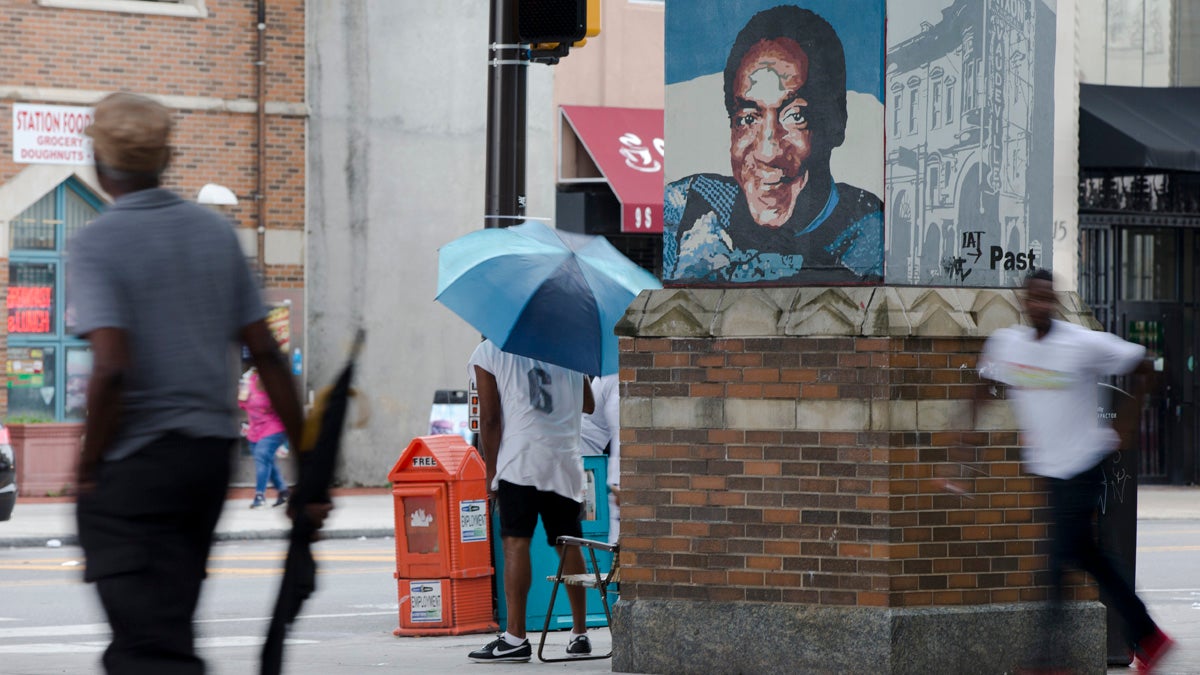Temple defends trustees board chairman in wake of latest Cosby revelations

Pedestrians move past a mural depicting entertainer Bill Cosby on Market Street in Philadelphia. (AP Photo/Matt Rourke)
New revelations about the relationship between the chairman of Temple University’s board of trustees and disgraced celebrity Bill Cosby have triggered a call for the chairman’s resignation, along with a staunch defense of his ethics from school officials.
At the heart of the dispute: newly released court documents showing that attorney Patrick O’Connor, a Temple trustee for 27 years, represented Cosby in 2005 when the comedian was being by a Temple employee who claimed he sexually assaulted her.
Minutes from Temple trustee meetings also show that O’Connor, who stood literally by Cosby’s side as he gave a detailed deposition describing his use of drugs and alcohol to have sex with young women, stood figuratively by the comic’s side for the next decade, voting three times to approve him for new terms as trustee.
O’Connor voted in Cosby’s favor in October 2006, again in October 2010, and finally in October of 2014.
Late last year, Cosby resigned from Temple’s board of trustees, a seat he had held since 1982.
To some, O’Connor’s dual relationship with Cosby and Temple represents a conflict of interest and a breach of the trust of the university community.
“I had no idea who he represented,” said Arthur Hochner, a business professor and the president of the union representing school staff, the Temple Association of University Professionals. O’Connor “should step down … He had to make the choice back then whether he was going to represent the trustees, or whether he was going to represent Bill Cosby.”
However, Temple officials are strongly defending their board chairman’s ethics and judgment, saying that O’Connor’s professional relationships with Cosby were fully disclosed to his fellow trustees, and that he wasn’t working for Cosby at the time he voted to retain him on the Temple board.
Temple president vouches for board chairman
“In my experience, the highest standards of ethical behavior and the best interest of Temple have always guided the chairman’s leadership and relationship to the university,” according to a statement from Temple President Neil D. Theobald.
O’Connor did not respond to a request for comment. Temple’s ethics guide for board members primarily concerns rules about direct financial conflicts, but also notes that no single rule can cover all situations, and that good judgment will always be required.
The guidelines direct all trustees to keep the “best interests of the university” in mind at all times, quoting former Supreme Court Justice Benjamin Cardozo: “A trustee is held to something stricter than the morals of the marketplace. Not honesty alone, but the punctilio of an honor the most sensitive, is the standard of behavior.”
University officials deny Hochner’s contention that O’Connor’s relationship with Cosby represented any kind of ethical breach, financial or otherwise. They said O’Connor followed all board policies.
“Trustees are subject to a longstanding policy of the board requiring regular disclosure of situations involving a potential conflict of interest,” a Temple spokesman wrote in a statement. “Mr. O’Connor’s representation of Mr. Cosby was disclosed and vetted in accordance with board policy.”
It was appropriate for O’Connor to vote on Cosby’s bid for a renewed spot on the board, the statement said, because by that time — 2014 — Cosby was no longer O’Connor’s client. Citing information obtained from O’Connor’s law firm, Temple officials said O’Connor stopped representing Cosby in 2006, soon after the sexual assault case against him was settled for an undisclosed sum.
As of this year, the school said, O’Connor is once again representing Cosby, “in connection with a challenge to the confidentiality of that [2006] settlement agreement.”
Trust is compromised, union leader contends
These assurances don’t change Hochner’s concerns. Now that O’Connor’s history with Cosby is known, Hochner said, it will be hard for students and faculty — particularly women — to trust a board chair who helped keep Cosby on the board of trustees.
Cosby was accused by a Temple staffer of drugging and raping her at his home in Cheltenham. While Cosby didn’t confirm those accusations in his deposition with O’Connor, he admitted using sedatives such as Quaaludes to aid what Cosby described as his seduction of other young women, while hiding his affairs from his wife.
O’Connor’s defense of such behavior is troubling, Hochner said.
“He is the chairman of the board, and is responsible for the affairs of Temple University,” he said. “The fact that he was the attorney of someone who was accused of sexual misconduct at Temple University is a big negative.”
In addition to O’Connor’s departure, Hochner would like to see an unequivocal statement from Temple condemning sexual assault in general, and Cosby’s admitted practices in particular.
“The board of trustees and the administration should speak out against sexual assault, and say something about the allegations and the admissions that Bill Cosby made in this deposition,” he said.
*Editor’s Note: This story has been updated to reflect that long-time Temple trustee Patrick O’Connor voted three times to approve Cosby for new terms as trustee, not just once.
WHYY is your source for fact-based, in-depth journalism and information. As a nonprofit organization, we rely on financial support from readers like you. Please give today.




